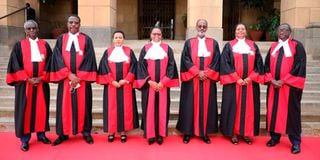Fate of lawmakers’ control of CDF lies with Supreme Court

Chief Justice and President of the Supreme Court Martha Koome (centre) and Deputy Chief Justice and Vice-President of the Supreme Court Philomena Mwilu (third left) with Supreme Court Judges (from left) Isaac Lenaola, Dr Smokin Wanjala, Mohamed Ibrahim, Njoki Ndung’u and William Ouko at the Supreme Court Building in Nairobi.
The fate of the Constituency Development Fund (CDF) now lies with the Supreme Court after members of Parliament and civil society groups yesterday finished making their final arguments on the protracted dispute that started nine years ago.
At stake is the control of more than Sh50 billion that MPs are expecting to be allocated to the CDF by the Treasury from the national government’s ordinary revenue in the current financial year.
For their part, the civil society groups -- The Institute for Social Accountability (Tisa) and the Centre for Enhancing Democracy and Good governance -- urged the top court to nullify the entire CDF Act and declare it unconstitutional.
In another prayer that could see MPs lose grassroots political influence, the activists also urged the Supreme Court to find that the billions of shillings allocated to the CDF annually should instead be disbursed to county governments.
Further, they want senators, members of the National Assembly and county commissioners removed from being members of County Development Boards (CDB).
According to the groups, it is a violation of the structure of devolved government to make persons who are members of the national government or Parliament to be members of a decision-making body in a county government.
Through lawyer Suyianka Lempaa, the groups submitted that the CDF law is unconstitutional because it offends the principles of public finance, division of revenue and the division of functions of the national government and county governments.
“As to the vertical separation of powers, we submit that MPs and cabinet secretaries involved in the management or implementation of the CDF constitute the executive and legislative organs of the national government,” the court heard.
“Their involvement in development activities at the county level not only threatens to undermine the functions of the county government but also blurs the Executive and Legislative divide that underlies the principle of separation of powers,” said the advocate in his submissions.
Oversee national revenue
In addition, the Supreme Court heard that the Act not only introduces an active conflict in the National Assembly’s equitable allocation of funds, as well as appropriation, but also its ability to oversee national revenue and its expenditure through the CDF.
For instance, the accounting officer of the CDF board is accountable to the National Assembly for its financial management, yet under the Act, the same officer is appointed with the approval of the National Assembly. The group said the purpose and effect of the CDF Act is to introduce a third tier of devolution.
But the National Assembly and the CDF defended the legality of the fund and urged the court to dismiss the petition on grounds that the dispute should be resolved through alternative dispute resolution mechanisms, before resorting to judicial proceedings.
“It was not the intention of the framers of the Constitution that disputes between the two levels of government should be filed in court in the first instance. This is because it does not serve the public interest, nor the principles of good governance and accountability, to waste public funds in litigating issues which can be resolved through alternative dispute resolution,” said the National Assembly.
On claims that the Act is unconstitutional because senators were not involved in the enactment, the MPs said the Senate had no role to play in the enactment.
Further, that there is no dispute between the two Houses. The Senate, which is a party to the proceedings did not question the Act both in the High Court and Court of Appeal.
Development activities
For its part, the CDF Board said it is not unconstitutional for a member of National Assembly to be involved in development activities in their constituency.
It stated that the fund is constitutional since the national government can conceptualise and fund development initiatives at the local level, provided that such initiative respect the system of governance in existence.
The dispute started at the High Court in 2013 and escalated to the Supreme Court after the Court of Appeal overturned the High Court’s finding that the CDF was unconstitutional in its entirety.
The appellate court instead issued a declaration that only sections 24(3)(c), 24(3)(f) and 37(l)(a) of the CDF Act were unconstitutional.
The judgment dated November 24, 2017 prompted the two NGOs to petition the Supreme Court to render itself on the matter. They want the top court to overturn the judgment and orders of the Court of Appeal.
They also want the court to declare that the failure to involve the Senate in the passage of the CDF Act was unconstitutional and any organ or body established by the Act is illegal as it is created without the authority of the law.
The Supreme Court bench led by Chief Justice Martha Koome, her deputy Philomena Mwilu and justices Smokin Wanjala, Njoki Ndung’u and William Ouko said the judgment will be issued on notice.





